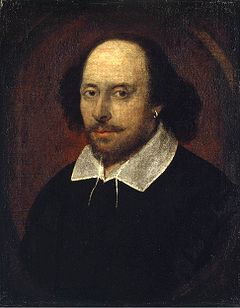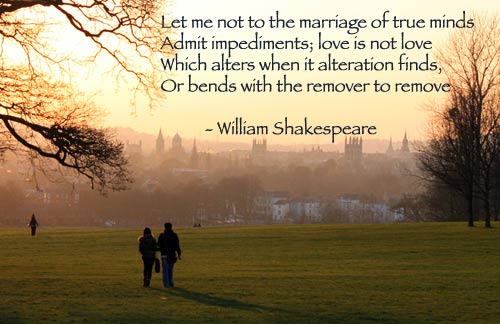
William Shakespeare (1564-1616). English poet and playwright – Shakespeare is widely considered to be the greatest writer in the English language. He wrote 38 plays and 154 sonnets.
Short bio of William Shakespeare
William Shakespeare was born in Stratford-upon-Avon on 23rd April 1564.
His father William was a successful local businessman, and his mother Mary was the daughter of a landowner. Relatively prosperous, it is likely the family paid for Williams education, although there is no evidence he attended university.
In 1582 William, aged only 18, married an older woman named Anne Hathaway. They had three children, Susanna, Hamnet and Juliet. Their only son Hamnet died aged just 11.
 After his marriage, information about the life of Shakespeare is sketchy, but it seems he spent most of his time in London – writing and acting in his plays.
After his marriage, information about the life of Shakespeare is sketchy, but it seems he spent most of his time in London – writing and acting in his plays.
Due to some well-timed investments, Shakespeare was able to secure a firm financial background, leaving time for writing and acting. The best of these investments was buying some real estate near Stratford in 1605, which soon doubled in value.
It seemed Shakespeare didn’t mind being absent from his family – he only returned home during Lent when all the theatres were closed. It is thought that during the 1590s he wrote the majority of his sonnets. This was a time of prolific writing and his plays developed a good deal of interest and controversy. His early plays were mainly comedies (e.g. Much Ado about Nothing, A Midsummer’s Night Dream) and histories (e.g. Henry V)
By the early Seventeenth Century, Shakespeare had begun to write plays in the genre of tragedy. These plays, such as Hamlet, Othello and King Lear, often hinge on some fatal error or flaw in the lead character and provide fascinating insights into the darker aspects of human nature. These later plays are considered Shakespeare’s finest achievements.
Some academics, known as the “Oxfords,” claim that Shakespeare never actually wrote any plays. They contend Shakespeare was actually just a successful businessman, and for authorship suggest names such as Edward de Vere. Nevertheless there is evidence of Shakespeare in theatres as he received a variety of criticism from people such as Ben Johnson and Robert Greene. When writing an introduction to Shakespeare’s First Folio of published plays in 1623, Johnson wrote of Shakespeare:
“not of an age, but for all time”
Shakespeare the Poet
William Shakespeare wrote 154 sonnets mostly in the 1590s. These short poems, deal with issues such as lost love. His sonnets have an enduring appeal due to his formidable skill with language and words.
“Let me not to the marriage of true minds
Admit impediments. Love is not love
Which alters when it alteration finds,
Or bends with the remover to remove:”
Admit impediments. Love is not love
Which alters when it alteration finds,
Or bends with the remover to remove:”
– Sonnet CXVI
The Plays of Shakespeare
The plays of Shakespeare have been studied more than any other writing in the English language and have been translated into numerous languages. He was rare as a play-write for excelling in tragedies, comedies and histories. He deftly combined popular entertainment with an extraordinary poetic capacity for expression which is almost mantric in quality.
“This above all: to thine ownself be true,
And it must follow, as the night the day,
Thou canst not then be false to any man.
Farewell: my blessing season this in thee!”
And it must follow, as the night the day,
Thou canst not then be false to any man.
Farewell: my blessing season this in thee!”
– Lord Polonius, Hamlet Act I, Scene 3
During his lifetime, Shakespeare was not without controversy, but he also received lavish praise for his plays which were very popular and commercially successful.
His plays have retained an enduring appeal throughout history and the world. Some of his most popular plays include:
- Twelfth Night
- Henry V
- Romeo and Juliet
- Macbeth
- Hamlet
- King Lear
- Othello
“All the world’s a stage,
and all the men and women merely players:
they have their exits and their entrances;
and one man in his time plays many parts…”
—As You Like It, Act II,
Death of Shakespeare
Shakespeare died in 1616; it is not clear how he died, and numerous suggestions have been put forward. John Ward, the local vicar of Holy Trinity Church in Stratford (where Shakespeare is buried), writes in a diary account that:
“Shakespeare, Drayton, and Ben Jonson had a merry meeting and it seems drank too hard, for Shakespeare died of a fever there contracted.”
In 1616, there was an outbreak of typhus (“The new fever”) which may have been the cause. The average life expectancy of someone born in London, England in the Sixteenth Century was about 35 years old, Shakespeare died age 52.
Shakespeare’s Epitaph
Good friend for Jesus sake forbeare
To digg the dust encloased heare
Blessed by y man y spares hes stones
And curst be he y moves my bones
To digg the dust encloased heare
Blessed by y man y spares hes stones
And curst be he y moves my bones
– More interesting facts on Shakespeare

Quotes on Shakespeare
“Shakespeare, no mere child of nature; no automaton of genius; no passive vehicle of inspiration possessed by the spirit, not possessing it; first studied patiently, meditated deeply, understood minutely, till knowledge became habitual and intuitive, wedded itself to his habitual feelings, and at length gave birth to that stupendous power by which he stands alone, with no equal or second in his own class; to that power which seated him on one of the two glorysmitten summits of the poetic mountain, with Milton’s his compeer, not rival.”
– Samuel Taylor Coleridge, Biographia Literaria (1817)
Popular quotes of Shakespeare
“This above all: to thine own self be true,
And it must follow, as the night the day,
Thou canst not then be false to any man.”
– Polonius, giving Laertes a pep talk. (Hamlet)
“To be, or not to be: that is the question:
Whether ’tis nobler in the mind to suffer
The slings and arrows of outrageous fortune,
Or to take arms against a sea of troubles,
And by opposing end them. To die: to sleep;”
– Hamlet
“There are more things in heaven and earth, Horatio,
Than are dreamt of in our philosophy.”
– Hamlet (to Horatio on seeing a ghost)
“We are such stuff
As dreams are made on, and our little life
Is rounded with a sleep.”
– The Tempest (Prospero)
“Men at some time are masters of their fates:
The fault, dear Brutus, is not in our stars,
But in ourselves, that we are underlings.”
– Julius Caesar (Cassius to Brutus)
“Life’s but a walking shadow, a poor player
That struts and frets his hour upon the stage,
And then is heard no more. It is a tale
Told by an idiot, full of sound and fury,
Signifying nothing.”
– Macbeth (on learning of death of Queen)
“There is nothing either good or bad, but thinking makes it so.”
— Hamlet in Hamlet
“Self-love, my liege, is not so vile a sin, as self-neglecting.”
—Dauphin in Henry V
“Our doubts are traitors,
And make us lose the good we oft might win,
By fearing to attempt.”
—Lucio in Measure for Measure



No comments:
Post a Comment